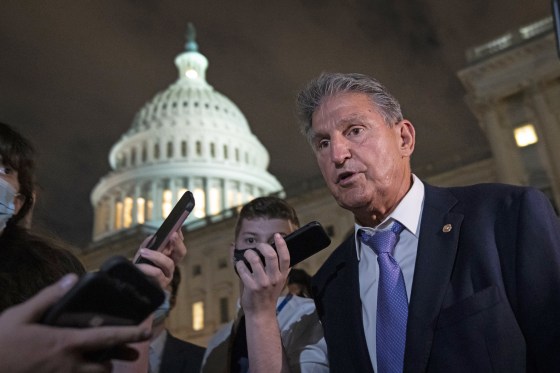WASHINGTON — Speaker Nancy Pelosi delayed a House vote Thursday night on the bipartisan infrastructure bill as the Biden White House failed to cut a deal with moderates, exposing the party’s deep ideological differences and concluding Biden’s rough September.
But the big news from yesterday — with Pelosi promising a vote on the infrastructure bill today — is that the party is now closer to an agreement over the larger reconciliation package.
We learned that Sen. Joe Manchin, D-W.V., told Senate Majority Leader Chuck Schumer in July (more on that below) that his ceiling for the reconciliation bill was $1.5 trillion, countering criticism from progressives that he was refusing to signal what he was for.
Similarly, Sen. Kyrsten Sinema, D-Ariz., released a statement saying that she shared her concerns and dollar figures with Schumer and the Biden White House back in August, although her demands remain less specific (at least publicly) than Manchin’s.
And the White House was much more engaged in getting deal Thursday than it had been.
So the outline of a deal definitely seems within reach: a reconciliation package of at least $1.5 trillion — on top of the Democrats’ already-passed $1.9 trillion Covid relief bill and $550 billion in new infrastructure spending.
That’s progress.
There are two ways to look at yesterday’s developments on Capitol Hill: One, Democrats remain deeply divided in Biden’s first year as president.
Two, Democrats today are closer than ever to an agreement.
The question we have, however, is whether that final agreement comes in the next few hours, the next few weeks, or the next few months.
It’s been an ugly process to get to yes
While Democrats are closer to an agreement on their reconciliation package, we also have to state the obvious: The process getting here has been ugly.
Primary threats against Sinema.
Protests outside of Manchin’s houseboat.
An already-passed bipartisan infrastructure bill hanging in the balance.
Schumer not communicating to the public — and maybe even to members of his party — that Manchin had put his demands in writing.
And all of it to wrangle a few extra hundreds of billions of dollars from Manchin and Sinema?
During a deadly pandemic?
And at a time when many Democrats believe the rise of authoritarianism — and a possible return by Trump — is the country’s biggest threat?
Bottom line: What kind of scar tissue does this leave Democrats?
Tweet of the day
Shameless plug
Keep an eye on your inbox today for our new weekly newsletter highlighting the best from Meet the Press Reports. This week, we dig into the serious challenges posed by climate change, including how it’s jeopardizing water access in the West.”
Data Download: The numbers you need to know today
702,361: The number of deaths in the United States from the virus so far, per the most recent data from NBC News. (That’s 2,876 more since yesterday morning.)
119 days: How much time elapsed between America’s 600,000th recorded Covid death (per NBC News analysis) and it’s 700,000th.
1 in 434: The portion of rural Americans who have died from Covid, per data from the Rural Policy Research Institute.
1 in 513: The portion of urban Americans who have died from Covid, per RPRI data.
43,513,314: The number of confirmed cases of the coronavirus in the United States, per the most recent data from NBC News and health officials. (That’s 114,093 more since yesterday morning.)
392,909,995: The number of vaccine doses administered in the U.S., per the CDC. (That’s 917,333 more since yesterday morning.)
55.6 percent: The share of all Americans who are fully vaccinated, per the CDC.
66.9 percent: The share of all U.S. adults at least 18 years of age who are fully vaccinated, per CDC
34 percent: The portion of parents who say they plan to get their 5-11 year old children vaccinated “right away” if a Covid vaccine is approved for them, per a new KFF poll.
64: The number of days until the government funding authorization runs out, after Democrats passed a temporary reprieve to avoid a shutdown Thursday.
ICYMI: What else is happening in the world
A federal appeals court will allow the Biden administration to continue blocking migrants at the border under a previously little-known public health code called Title 42.
Justice Alito pushed back on criticism of the Supreme Court’s use of the “shadow docket” and accused critics of trying to intimidate the court.
The Senate confirmed a new director for the Consumer Financial Protection Bureau.
A new FBI inspector general report found “widespread” issues with Foreign Intelligence Surveillance Act applications.




